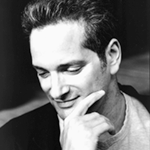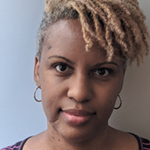Apocalypse Movie
City’s got no more of us. Asked A-ma and she said it’s because the government’s got a van to take people like us out of the city. Can imagine it: black vans with windows tinted green like bug eyes, all those bodies stolen away like women in wartime. The way bigger countries clean up for the Olympics, apparently. Learned this later. Typhoon season now and the rain hisses like gasoline. Imagined my spine as a wick and ran home faster. At home, asked A-ma where our women were taken, she said the countryside. Flanks of fields with knives growing downward like root vegetables. Hoped where they were the rain was not hurting. Hoped maybe it’s the sea where they take them, not too hot and no government. Waiting for them: a big boat to cross out the horizon, a big boat to slip farther, farther out with each jerk of the tide. I wonder who pulls the water like a pelt. Like difficult birth. Centuries of our bodies crowding the prow like rows of teeth. If our people found another island, an island they were not born on, they could do anything they wanted, like go naked or gamble. Could steer themselves to an iceberg or better, never land at all. Just go in circles around the planet, yearly like rings in a tree. Gege says, that’s dumb they have no food but he doesn’t know that’s the point. Read that a ghost plane is a plane that loses oxygen but keeps flying, but all the people inside die off. Eventually, a mass grave in the sky, bodies that would never have to ground. Imagined the plane drifting out and out like a balloon released, Gege asking what was I smiling about. Remembered that a typhoon was coming and herded in the grandparents, dried A-gong’s warm soft head like a sac of mosquito eggs. A-ma made the soup, cold with dates and tasted like urine.
***
This river has a habit of clearing itself like a throat. The waves hacking up phlegm, leaving a gum around our ankles. It’s summer and A-ma’s listening to the radio outside, far from the bank because she doesn’t like wet things. Legend goes, she refused to hold me when I was born until the nurse double-washed and double-dried me of all the jellied birth fluids, blood and brine. Gege was born dry as a nut. We have rhyming names and we try to ignore this fact. The water stings like sweat. A-ma reminds us every day that our grandfather was born here in this river, but I can’t imagine someone like him being born at all, his two fists popping out before the rest of him.
It’s like the Japanese legend: Momotaro, the hard boy born from a split peach, a sword in hand. But the only village-terrorizing monster he would ever kill is us. A-ma has taken to saying things like, children are like doors, you should be able to slam them shut when you want, that means you. I shut. I count the hinges on my body, all the ways to pronounce please. A-ma’s become a Christian again, says the more we take the river into ourselves, the cleaner we’ll be. The water’s jellied with mosquitos so none of us know what she’s talking about. When we drink the water, our bellies bloat and our shit shines with worms like pearls, a braceletful. A-ma says we should go soon, river’ll wipe us of our scent so we can run better. We said from who and she said Nihonjin. Sometimes it’s The Chinese and she hides from us by playing dead. Then she forgets she’s not actually dead and we have to roll her over and show her our faces until she remembers. She says everything in Yilan creole, which according to The Missionaries is 70 percent Japanese, 30 percent Atayal. Endangered Language Project says we’re 80 percent endangered and A-ma grunts, says I’m an idiot melon if I don’t know 100 percent of people are 100 percent endangered. Yesterday, Doctor Hsiung said my A-ma’s lost 50 percent of her brain already. What does that mean, I ask, and he says it means her mind is just the rind. The melonmeat inside is already swallowed. Gege says that’s what happens when we get older, our brains backslide down our throats and every time we swallow, another memory goes on loan. Our memories are the maggots we pluck with chopsticks from the ruby stump of A-ma’s leg. It was amputated sometime during the war when an American bomb bastardized the hillside but it never healed. The stump fills with a jam we spoon out and lift to our lips and pretend to eat sweet, yum yum yum. It makes A-ma laugh. She says she remembers the bellies of those American planes, pulsing like clam meat, how much she wanted to scrape them from the shell of the sky and swallow. In some countries the sky is not survivable. We bring A-ma her husband’s old war medals. She only smiles if we tie the blue ribbon around her neck, if we help her read his certificate: Empire of the Rising Sun. The ribbon’s so worn it’s the color of canceled weather.
A-ma doesn’t tell stories about the sky anymore or about the bone in her thigh that was smashed to feathers. Instead she tells us a story about the sun, about the Tayal chief who blindfolded himself with a strip of his own skin in order to shoot down six suns and leave only the seventh one living. Without him we are charcoal, A-ma says, without him we are pyred. What piece of his skin did he wear, I want to know. A-ma says of course it was skin from his ass because that’s where he had extra. She says a long time ago we had tails and that’s what he cut off, his tail, and out of respect for the chief, the rest of us snipped off our tails. I say that doesn’t explain why I was born without a tail. It should be hereditary I tell her, because it’s not the wound that’s passed down, it should be the tail. Severance is inheritance says A-ma. Some people pass down what they have and some people pass down what they’ve lost. That’s why we are born with our tongues embalmed like wicks in the wax of our throat. It’s because a long time ago someone cut out our tongues as punishment. For what, I say. A-ma says why is for the weather. Questions are the gutters of the mind she says, and mine are full of mud. I swallow, swallow.
Gege and I after rubbing A-ma’s leg with a grease-rag: sweaty. We watch apocalypse movies pirated by my cousin from Kaohsiung who drives a seafood delivery truck and is now shaped like a fish blade. He is the kind of skinny that means I am generations of hunger in one body. We are impressed by this and in exchange for the bootlegged movies we feed him what we can find. He can swallow whole green guavas. He can eat shark teeth, a done lightbulb. From a monk he learned how to digest light like a tree. He calls this photo-sin-message. It means that as long as the sun feeds him through the windshield, he never needs to eat or take a break. One time he drove for six days straight and kept himself awake by holding a lit match between each of his fingers while driving. When they singed he swerved.
Gege and I watch movies where the world is ending because of many things, like the ocean rising to our chins, tucking us in like a bedsheet, and sometimes storms that make A-ma flinch because she thinks it’s playing outside our house, and also from deadrisen who eat their own brains. Gege says ha, I told you so about the brains. But those people aren’t grandmothers, I say pointing at the screen. And they’re not swallowing their brains, it’s more like munching, and Gege says okay but in the end it’s the same. Their memories metabolize into violence. They are slow but they don’t bleed and every human promises each other that they will shoot whoever is bitten. I ask Gege, would you kill me? And he says, probably, if I had a weapon. A-ma is listening and she curtains the TV screen with a bedsheet and says don’t watch don’t watch don’t watch. She says back during the war our grandfather made her swear, if the Japanese enlist me to fight for them, slit me right here. A-ma points at her own oystered throat. We don’t ask if she did it. She wears his war medals around the house, around that throat, and says cut it off me cut it off me off me. Gege and I want to continue watching the movie so we duck beneath the bedsheet and watch close-up with our lips on the landscape and all the humans in the end are turned, emptied of eyes. A-ma killed ducks for many years, slitting their throats to bleed the meat. We broth the bones and pour it into the river to feed our dead. At home A-ma is wielding her needle and thread, the medals in her lap. We watch our movie with the sound turned off so she doesn’t shroud it again. A-ma has mended those medals many times, wincing every time the needle butts through the ribbon and into her skin. She deliberates on each stitch and says words we don’t know, like names the river gave itself before it was named. We know it’s punishment she’s performing. His neck, his neck, she says, why didn’t I. She labors the needle through her finger and the floor flickers with blood, scales on a fish. We pack mud onto her finger and drag her blood out of the house like luggage. When the needle breached through her finger, A-ma said here is what I owed you, no mercy.
***
When our grandfather walked backward out of the war without hands. When our people are thrown into vans. When the canefields singe like hair and afterward we find bones in the dirt, bracelets of our remains. When we eat guavas and swallow the seeds like broken teeth. When A-ma, though she’s a hundred years old, grows her hair fifteen inches and sells it every six months. She says have you ever seen hair like mine, dark and virgin, not like the hair that’s been dyed brittle as fish ribs. Have you ever seen hair like mine like masts you can sail with, so thick the wind stalks it. Hair like mine is a mare’s. You can’t bridle it, you can only straddle and ride it. Make a night of it. I brush it out for her, unknot it from the top of her head every morning. It’s so long now I can walk with it to the door. I can tie it around my waist and walk circles around the house. In the fields our women walk the rows of cane. It reminds me of praying, bobbing belly-up in the fish heat. Bones in the dirt, they dazzle. Crowns and crowns of us.
The hair-seller lives at the corner and she sells a kind of cream made of limes and mare-fat and acid that bleaches your nipples and knuckles and the roots of your hair. Inside her house, hair hangs from hooks on the ceiling like butchered beasts. A-ma sits in the woman’s kitchen and gets her hair severed, that river I unloose every morning, that dark I wade waist-deep. I watch the woman’s scissors, the kind used for snipping tendon. Blades beaching against A-ma’s neck: I watch to intervene. But the woman shears only the hair and it makes a brittle sound like bone breaking. For years I thought that when hair is cut, it falls white. But A-ma’s hair is the darkest of the shades hanging from the ceiling. The woman gathers the hair into a broom. It’s good hair she says, thick enough to crochet into a whip. I want to duck behind the curtain of it, count constellations inside it.
A-ma goes home and starts growing again. She says it’s her job to sit all day very still so her hair will grow back thicker and longer, hair that can harness hips and slug rivers in the throat. We leave her to the shade, to her shampoo made of ash. In the dim while A-ma is growing, Gege and I continue watching our bootleg movies even though they cut out halfway and halt on images of women screaming. Gege learns how to pronounce the titles, the credits, the names of the actors. He tells me, Apocalypse means the world is ending which means people are going extinct. I say that happened already. A long time ago A-ma told us this story. When the military came, all the women in the mountains hanged themselves with their own hair. Good hair, A-ma says, doubles as a noose. Grow it at least as long as your life. The soldiers tried to cut the women down, but the hair transformed into snakes and even now farmers are afraid of the snakes in these trees and buy big white dogs that bark at the branches at night.
Gege says it’s more fun if we think maybe those women became brain-melon eaters and that they, like us, chop the rinds and salt them to eat in a salad. When I was little and saw all the hair hanging in that woman’s house, when I had to bat the strands out of my face to see where A-ma would kneel, I thought all hair was farmed from trees. A-ma, I said, how do we give this all back. A-ma and her neck now exposed and slick as a rind, walking without the weight of her hair: she said to me don’t worry, it grows back. That night I dreamed all those hanged women grew back in the fields, sweet-spined as cane, and that we have to cut them down one by one in crop rows, our mothers our mothers our mothers.
My hair is the color of bathwater. It sprints down my back and I hack it off, throw handfuls of strands at the trees. I decide I don’t want to wear it as a weapon, my hair. I decide I will be like those movies and outlive disaster. The plots are always about how to survive as the last people on earth. Gege and I laugh at the characters. We gild the screen with our spit, laughing so hard, because we are the last of our language and we know loneliness. We don’t have to pretend it. In the movies, people live underground in the dark and eat out of cans. A-ma says that’s how we used to live when we were hiding from the seven simultaneous suns, before the first hunter shot all but one down. They should all thank us, A-ma laughs, pointing at the TV screen, her hair fingering into a grip. Say thank you for shooting your own suns and saving the seas from evaporation. Say thank you for your sacrifice.
***
In 2004, the newspaper headline said Yasukuni Shrine and the Double Genocide of Taiwan’s Indigenous Atayal. First genocide: the beheading of Taiwanese Aboriginal people, all males over 15. Second was marching them into the Japanese Imperial Army, sending them south to kill for their killers. The usual things happened, too: new language, new fruit salads, new life expectancy. A professor saying: because they were likely to die, they did. Next slide.
***
Legend goes, my grandfather was raised so soft that he didn’t know the color of blood until he saw his family killed. Before he died, he once tried to wear a slab of meat as a coat. After the dementia, he started eating with only his left hand, and we could never get him to show us his right. It was permanently curled like a wisp of smoke. Our new game was to ask him what he was holding, and every time he’d answer differently: a kumquat, a Japanese sandal, a wire doll. A-ma spends his veteran’s pension on a new kitchen, this one metal instead of wood. Nothing can burn it down. A-ma who taught me that knives sharpen themselves if you use them enough.
***
I start every morning by holding my thumb to the sun because I like to see the color of my own blood staring back at me. Gege’s plucking stones from the riverbed to put in the stone-dish on top of our toilet, which is for our Fengshui. The number one thing that’s bad for Fengshui is daughters, according to A-ma. She makes me kneel to the Virgin, makes me recite the names of the land: tang-ow no ke, kinus no hanasi, zibun no hanasi, kangke no ke. Tang-ow no ke, kinus no hanasi, zibun no hanasi, kangke no ke. I remember when A-ma and I danced barefoot in the wooden kitchen to Kangding Love Song, the cigarette smoke she lashed to my back. Look, she said, I’m borrowing the clouds. My knees sour on the tatami mat. I’ve been still for so long it feels like my bones have pickled in the flesh. Gege in the next room is rattling his X-Box, says goddamnit, the heat gets in everywhere. A-ma says, pray for our release. A-ma screaming in the next room, says someone is cutting off her head, someone is melting down her eyelids for spare bullets. Says, cut me to pieces so they can’t take me all away.
***
On the news today: Aboriginal woman claims to have given birth to a severed head. LIVE birth video will play at 11. Miss Taipei got plastic surgery. Last seen in Dongqu with a handful of men and an eyeful of clotted blood. It’s true, then. She got her nose raised to a curb, her chin down to knifepoint. We haven’t decided if we hate her for it, just that she ordered two orders of chickensteak and three of those soft sausages the size of pinkies. A-ma says to change the channel but forgets there’s only one. So we put in the movie, the new one from Hong Kong where everyone fights with knives but there’s never any blood. Where is all the blood, A-ma asks me, and I say I don’t know. I think maybe they’re like the scarecrows we prop outside in the fruitfields, the ones dressed in our clothes. The birds bomb off their limbs and we pull blonde hair out of their torsos. Gege says, you two idiot melons, there is no blood because there is no wound, it’s all fake. Even the knives. But A-ma leans close to the screen, so close she’s tonguing the glass, and says it looks real. So real I can see the shadow of the blade scorched onto her face. Gege says it’s made of rubber or retracts on impact. But A-ma keeps watching with her eyelashes combing the light, saying I’m looking, I’m looking, pause when I tell you to. Now. We pause, and the screen seizes up. A man in white is stabbing a man in black and the knife has reentered the torso. A-ma says okay, maybe there is no real, but if you look close enough, there must be a hole in one of those bodies, a hole to dilate around our heads like a halo, to blood this beginning.

K-Ming Chang / 張欣明 is a Kundiman fellow, a Lambda Literary Award finalist, and the winner of a 2019 Pushcart Prize in poetry. Her debut novel Bestiary is forthcoming from One World/Random House in September 2020. More of her work can be found at kmingchang.com.

 BACK TO ISSUE
BACK TO ISSUE

